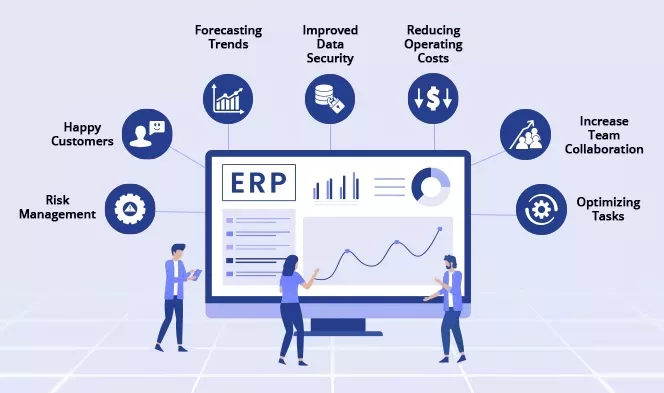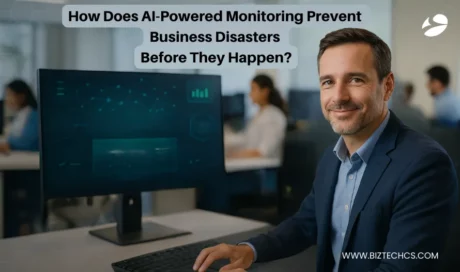4050
Why ERP Is Important for Businesses in 2025
21 Jun, 2021
5 min read

ERP stands for Enterprise Resource Planning; it is useful to manage and integrate core business processes. It is mainly used by large enterprises and is popular for small and medium-sized businesses. To make your business function smoothly, you need to define a process that makes it easy to run. This is when the ERP system helps. There are different types of ERP systems depending on your business models and the industry you serve.
This article will see some of the major benefits of the ERP system, its types, and things to consider before purchasing it.
The main aim of the ERP system is to make the business processes easier and automate manual tasks. Using the ERP system, you can automate manual tasks like inventory tracking, assigning tasks to employees, monitoring working hours, distributing salaries, generating financial reports, etc. By automating these complex processes, your employees can focus more on their key responsibility areas and finish tasks on time.
Example: Accounting teams can generate sales-related reports independently instead of relying on their sales managers. ERP system provides fast data access for managers and stakeholders and helps decision-makers make the right decisions for the company. All the needed information is in real-time, which helps to make timely decisions.
Team collaboration is the core part of making any business run successfully. With the help of an ERP system, this becomes easy as the data is stored in the centralized structure, making it easy for teams to access. SaaS or cloud-based ERP systems can extend the existing inter-team collaboration across multiple offices in different locations over the internet. Hence, making it easier for cross-functional teams to collaborate.
ERP systems help companies save on operational costs as most activities are automated, and interruptions and delays in the tasks can be easy to monitor and find. All the complex work carries out quickly and reduces lead time. Companies can also reduce the amount of labor because ERP solutions take over daily tasks.
ERP solutions have firewalls and restriction controls that prevent a data breach. All the data is kept in a centralized system so that you can monitor the access points. Admins responsible for managing data can have full control over the data and provide limited access to other employees.
Example: Database administrators can provide access to users’ data based on employees’ role and responsibilities. This helps in keeping the data secured and providing limited access to employees. Admins can also deactivate accounts of old employees and grant access to new employees. They can also have a detailed history of each user’s activities which helps them know if any unauthorized person has access to sensitive information.
One of the most important things for business advancement is the ability to make accurate forecasts. Stakeholders depend on the reports to make forecasts that will affect the decisions they make. Hence, businesses need to get real-time, complete, and consistent reports that ERP can efficiently help. ERP reporting tools use filters and analytics that can filter inconsistent data and provide accurate data. The system provides data in real-time, which helps to make decisions efficiently.
Managing customers is the most important part of any business. Understanding and fulfill their needs is the primary goal of any business. Today in the digital age, people trust more in internet reviews and customer feedback. Hence, providing the best customer service is extremely important.
With the help of the ERP system, this becomes easy. You can integrate the ERP system with any CRM, and it also has an in-built CRM system. Using the ERP, your CRM system has access to customers’ data across business functions. CRM will show you customer information like contact information, purchase history, and billing information. This will help your team to serve your customers better. Moreover, such detailed insights will help you better understand your marketing and sales strategy and improve lead generation.
When companies grow and do business in different countries, it can become difficult to keep track of all the different regulations they have to abide by. Even local companies need to worry about various environmental concerns, information security, and human resources regulations. Many ERP systems provide proper regulations to help you maintain and comply with the laws and regulations. Many built-in auditing tools help you document things like chemical use and tax provisions. This makes it easy to have reports and send them to other country’s governing bodies.
ERP system also provides tools to manage risks and helps to enhance reliability and accuracy to improve overall financial performance. Forecasting tools allow users to predict events when it comes to demand, labor, and budget. With this information, you can develop more secure budgets, schedules, and product development plans.
Read Also: A comprehensive guide to ERP and Open-ERP Systems
Next up, let’s see different types of ERP system and their uses:
It is a conventional on-site ERP system in which the system is installed locally on your company’s hardware and server managed by an IT staff. Initially, the investment is higher in ERP systems as you will need to purchase servers to run the system. You will need to invest in IT staff that can manage and maintain the system.
Despite so much initial investment, an on-site ERP system is a preferred solution as companies can handle their data to ensure safety. It even offers ease of customization and offers customization to control the implementation process. Conventional ERP solutions are usually more prevalent in large companies.
Another name for Cloud ERP is SaaS ERP; it is a type of ERP deployment that allows companies to manage centralized data via internet connection. Your ERP vendor is responsible for the ERP system’s smooth performance and will monitor it through the background. Users like you need to log in to the system to access it.
The investment cost for cloud ERP systems is lower than on-premise ERP systems. Users have to pay to use the products monthly to use the product. Cloud-based ERP solutions are more prevalent in small and medium-sized businesses. Following are some of the advantages of Cloud ERP:
You guessed it right; this ERP system is a combination of on-premise ERP and cloud ERP. It serves as a logical solution for many companies who want to upgrade their current conventional ERP systems without changing them. Hybrid ERP helps companies to integrate or add functionalities to their existing ERP systems at a minimum cost.
Depending on your business requirements, you can select the type of ERP system you prefer to use. Each of them is best in its way and will help you to make the business process much simpler. Additionally, you can even build a custom ERP solution with odoo ERP development, Oracle, BizAutomation, etc. which makes it easier to carry out business operations.
Read More: How can we use ERP in manufacturing?
Next up, let’s see five things you need to consider while purchasing an ERP system:
Every business has different needs, and an ERP system needs to tailor to the unique needs of every business. So, first, understand the challenges your business is facing and the solution you expect from your ERP software. Explain all your needs in detail to your vendor so they can help you with the perfect solution.
Before finalizing the vendor, do a detailed study about your vendor, check their clients, do they follow industry standards, and learn about their clients’ testimonials. This will help you to understand your vendor better and their services.
Customer support is a necessity for customers. Support includes necessary elements like requirement analysis, project planning, implementation configuration, training and mentoring, and post-deployment support. Make sure that your vendor is providing all the necessary support and is easy to contact when needed.
ERP systems should be easy to integrate and adjust. Depending on your business needs, you might need plenty of integration and customization as your business needs can change anytime. Further, depending on this changed business module, you might need to add or change certain modules shortly. If you wish to expand your business, there are chances it will get more complex with each passing day. So, make sure that ERP software you choose provides you with the flexibility of making modifications when and where needed.
One of the main factors that you need to consider while choosing ERP software is the time it takes to implement. The implementation depends on how many adjustments need to be made. The more the customization, the longer the implementation process will be. The implementation of cloud-based ERP tends to be faster and simpler than the conventional one. So, make sure to choose the most suitable software which helps your company.
Read More: ERP for Automotive Industry
Every business has different challenges and has to find a solution for them. With the help of ERP systems, you need to define the correct solution and process for your business. It will help you and your employees to work efficiently and serve customers better. You can even consider developing custom ERP solutions using Odoo ERP development, Oracle, etc. Hence, consider the points we discussed before purchasing the ERP and, depending on your business requirements, choose the correct ERP system. If you still have doubts and want to know more about ERP systems and which is best, you can contact us. We have provided many Odoo ERP development solutions to our customers, making their business process simpler and helped them to build their ERP system.
All product and company names are trademarks™, registered® or copyright© trademarks of their respective holders. Use of them does not imply any affiliation with or endorsement by them.

Artificial Intelligence (AI)
127
By Afzal Qureshi
09 Dec, 2025

Artificial Intelligence (AI)
128
By Afzal Qureshi
09 Dec, 2025

Artificial Intelligence (AI)
73
By Afzal Qureshi
08 Dec, 2025